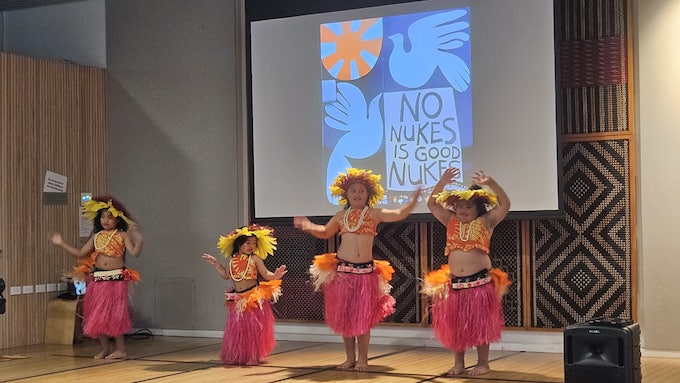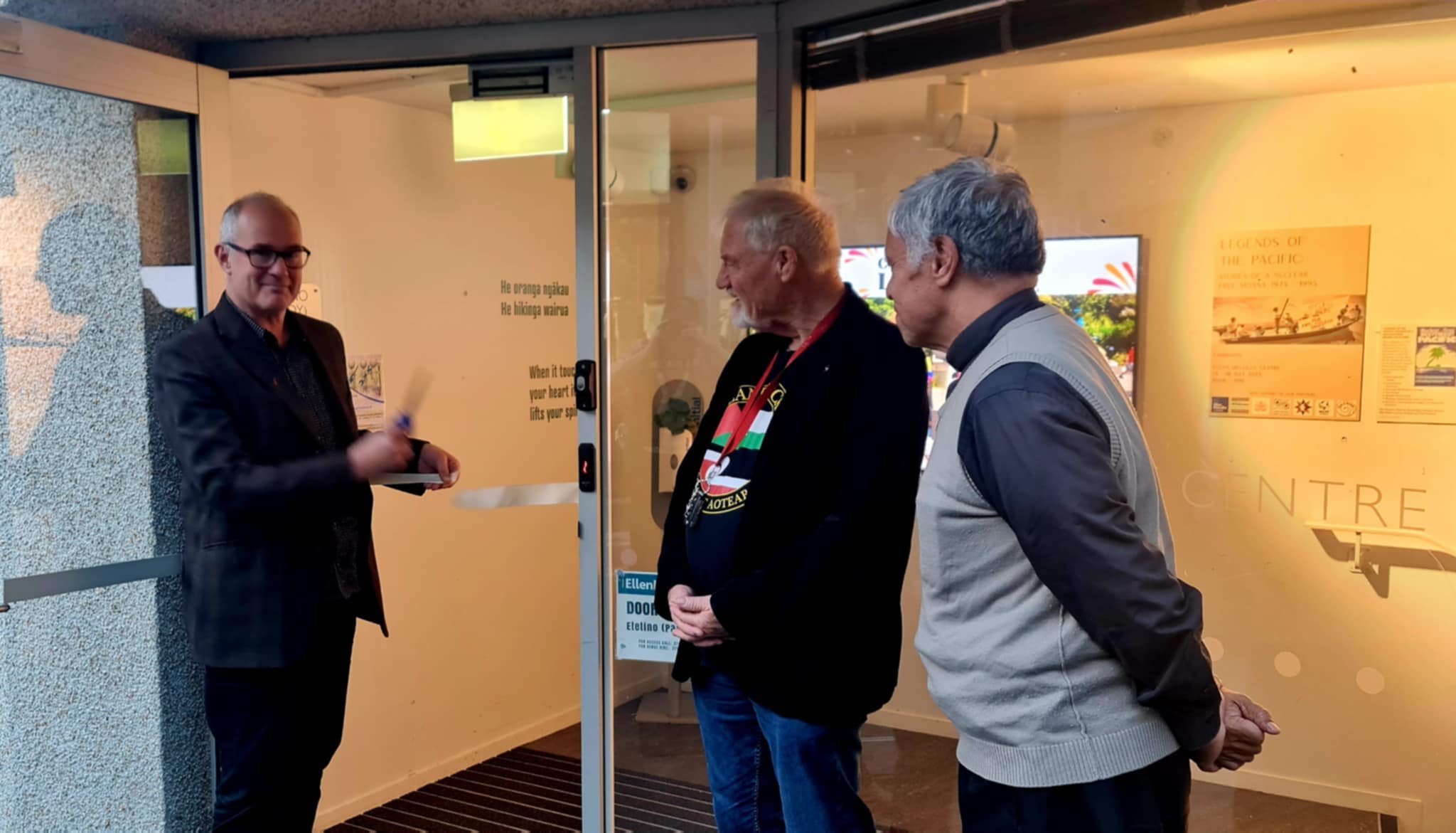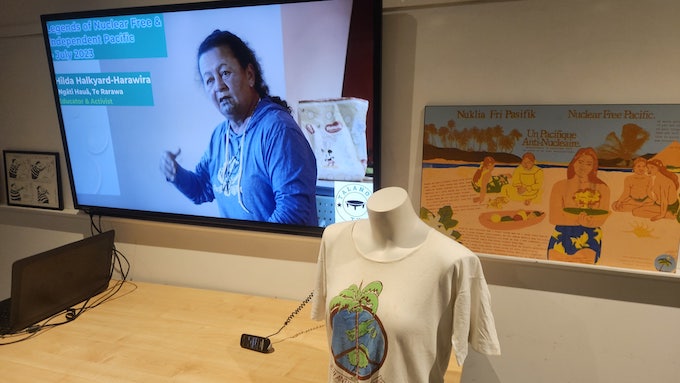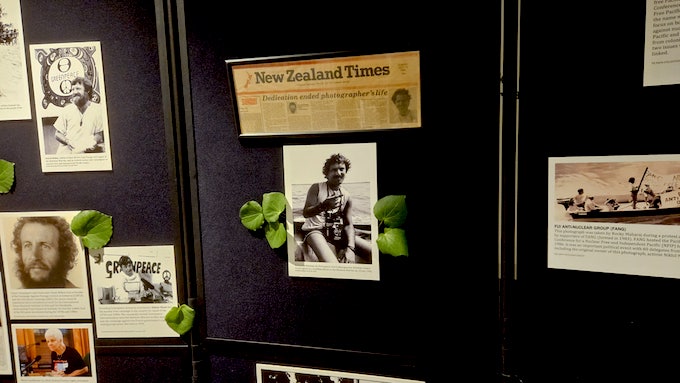MP Phil Twyford’s speech while opening the Legends of the Pacific: Stories of a Nuclear-Free Moana 1975-1995 exhibition at the Ellen Melville Centre today.
By Phil Twyford
Kia ora tatou. I am happy to be here with you today to open the exhibition Legends of the Pacific: Stories of a Nuclear-Free Moana 1975-1995.
I want to acknowledge David Robie whose seminal book Eyes of Fire has been republished to mark the 40th anniversary of the sinking of the Rainbow Warrior. David, thank you for a lifetime’s work of reporting important stories, exposing injustice and holding the powerful to account.
I have found the 40th anniversary of the sinking of the Rainbow Warrior stirring. The memory of the shock on hearing the news of the explosion seems like yesterday. And in the days that followed the slow dawning realisation that left us aghast that it had been an act of French state terrorism.
Much has been made in the years since of what a turning point this was, and how it crystallised in New Zealanders a commitment to the anti-nuclear cause.
But I want to talk today about the bigger regional phenomenon that shaped activism, public attitudes and official policies across our region, and what it can teach us today about New Zealand’s place in the world. I am talking about the Nuclear Free and Independent Pacific (NFIP) movement.
Activists and leaders from across the Pacific built a movement that challenged neocolonialism and colonialism, put the voices of the peoples of the Pacific front and centre, and held the nuclear powers to account for the devastating legacy of nuclear testing.
We must remember them. So many activists, community leaders, politicians across the region who were part of this movement. David’s book is an invaluable aid to that remembering.
Also the survivors of the nuclear testing, and all those who died prematurely from radiation exposure and the intergenerational cancers it left them with. Those who were displaced from their homes, and those who had their lagoons and lands poisoned.

This movement led to the creation of the Treaty of Rarotonga, the Pacific’s nuclear weapons free zone. It influenced governments and shaped the thinking of a generation.
But as Helen Clark writes about today’s international environment in the prologue to the newly republished Eyes of Fire by David Robie, storm clouds are gathering. With increasing great power rivalry, the rise of authoritarian leaders, and the breakdown of the multilateral system the spectre of nuclear war has returned.
New Zealand faces some stark choices about how we make our way in the world, keep ourselves and our region safe, and be true to the values we’ve always held dear.
The Nuclear Free and Independent Pacific movement can help us here. It should inspire us to maintain our own independence, embrace a strong regionalism and be a voice for peace and demilitarisation.
Unfortunately, the current National-led coalition government is rapidly going in the other direction.
It mimics the language of the security hawks in Washington and Canberra that China is a threat to our national interests.
That is then the springboard for a foreign policy re-set under the current government to a closer strategic alignment with the United States and with what are often more broadly referred to as the “traditional partners”. For that read the Five Eyes members, but particularly the United States.
For most of the last year and a half, the public debate about this reset has focused on whether New Zealand would be part of AUKUS Pillar Two, the arrangement to share high end war fighting technology that would sit alongside the first pillar designed to deliver Australia its nuclear submarines.
The New Zealand government has had little to say on AUKUS Pillar Two since the US elections. But defence engagement with the United States has escalated to include participation in groupings around supply chains, warfighting in space, interconnected naval warfare, and projects on artificial intelligence and cyber capabilities.
There are a number of things that need to be said about this, beginning with the idea that China’s increasing assertiveness and growing military strength are the root of the problem.
The fact is that China is already a great power. Its economy has on some measures reached parity with the United States, and it is behaving as great powers do.
As uncomfortable as this may be for its neighbours, this is not the biggest threat New Zealand faces. The biggest threat to our security and prosperity is the possibility of war in Asia between the United States and China.
Rising tensions could conceivably affect trade, and that would be disastrous for us. All-out war, especially if it went nuclear, would be catastrophic for the region and probably for the planet.
Many analysts believe, and I agree, that there is no realistic way the United States can retain the military primacy in East Asia and the western Pacific which it has had since the end of World War Two.
We are well into a transition from the United States being the leader of a post-World War Two international order and since the end of the Cold War the world’s only superpower, to a multipolar world.
The size, demographics, and economic trajectories of China and India mean that they will both be great powers at least in their own immediate neighbourhoods with considerable military assets.
Seen from this angle, it is not China’s great power status which is the biggest threat to us and our national interests. It is rather the risk of competition between the two current great powers spiralling into conflict. No matter how you frame it, then, we are living in a time of considerable risk.
It is not Labour’s view that everything is rosy and that we don’t need to be concerned. On the contrary. Militarisation, great power rivalry, the breakdown of multilateralism, and the daily assaults on international law should concern us all.

But the more pressing question is what is New Zealand’s best hope for the pursuit of security and prosperity in the face of all this uncertainty?
Let me begin by saying what is not in our best interests. When the biggest risk facing your country is conflict in your region between two great powers, joining one of those great powers in its struggle with the other is a high-risk bet, in more ways than one.
First, it is particularly risky when the great power which you are positioning through your foreign policy statements as a threat is also your largest trading partner.
Second, by in effect supporting a strategy of nuclear and other deterrence designed to contain a great power, you risk increasing the chance of a war that would be disastrous for all in the vicinity.
One of the videos in the Legends of a Nuclear-Free Pacific series. Video: Talanoa TV
AUKUS as Hugh White has said seems more likely to provoke than deter.
Third, I would question whether it makes any sense at all to be pursuing “closer strategic alignment” with or being a “force multiplier” of the transactional and coercive foreign policy coming out of Washington DC.
In sum, the risk is that New Zealand, by joining a strategy of deterrence under an increasingly unreliable partner, makes a negligible contribution to a losing cause, further provoking an unwinnable confrontation with no security guarantees or economic benefit in return.
So, what are the options for New Zealand in this environment? For the last 80 years, whether to conduct an independent foreign policy or one characterised by close alliance with a great power was a genuine choice for New Zealand. But that is no longer the case.
The new multipolar world and the demise of the 80-year-old US-led liberal international order leaves us no choice but to find ways to keep New Zealand and our region safe and pursue our national interests through an independent approach.
It’s Labour’s view that we can pursue security for New Zealand and the Pacific through active engagement with our partners across the Tasman and in the Pacific, and Asia, and be a voice for peace and demilitarisation.
Our defence capability should be based on a realistic assessment of what threats there are to New Zealand and our interests in the region — not an open-ended commitment to interoperability with the United States and its allies for the sake of being part of a club.
New Zealand must be a voice for peace. Nuclear disarmament and international law’s rules of war are under threat, but that also means that they are needed more than ever. New Zealand has a credible and principled voice on these issues that should be heard.
We must urge the great powers to coexist and share power in the region, rather than engage in an arms race and some kind of competition for supremacy.
In this multipolar world with multilateral institutions under such pressure we can still be a voice for the things we have long stood for, including the rule of law, rights of small states, disarmament, open trade, and human rights.
We are just going to have to work more selectively, independently and on a case-by-case basis, with those who share common interests.

So what would this approach mean for us in the Pacific?
I’ll finish with these three points.
First, we must demand nuclear justice. The nuclear powers have never owned up, apologised and made amends for their toxic legacy of testing. The Forum should lead a comprehensive internationally backed research programme to definitively document nuclear harms, as a precursor to victim assistance and environmental remediation.
Second, we should champion demilitarisation. In Honiara this September, Pacific Islands Forum leaders will meet to consider declaring the Pacific an “Ocean of Peace”.
New Zealand should support the proposal with a strong emphasis on demilitarisation, and an expanded notion of Pacific-led security focused on human development, climate action, and nuclear disarmament outside of intensifying major power competition.
Third, we should advance regional self-determination. That means strengthening the Pacific Islands Forum, and working alongside Pacific people on the things that really matter in the region: decolonisation and indigenous rights, urgent climate action, and sustainable economic development. By reforming labour mobility to be more circular, making sure policing is with the community, and managing fisheries responsibly for regional benefit, Aotearoa can be part of a community of states where there is opportunity and genuine security for all.
There is a clear choice here: get sucked into a new Cold War, this time between the US and China with the risk of nuclear war in Asia, or work with our friends and partners in the Pacific and Asia, be a voice for peace, and pursue a genuine Pacific-led idea of security.
The Nuclear Free and Independent Pacific movement gives us a good pointer on the way to go.
Phil Twyford is the Labour Member of Parliament for Te Atatū. He is spokesperson for immigration, disarmament and arms control, and associate foreign affairs. This speech was delivered at while opening the Legends of the Pacific: Stories of a Nuclear-Free Moana 1975-1995 exhibition at the Ellen Melville Centre on 12 July 2025. The exhibition was organised by the Asia Pacific Media Network (APMN).


